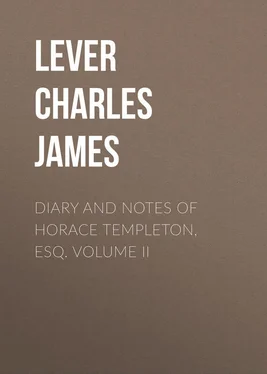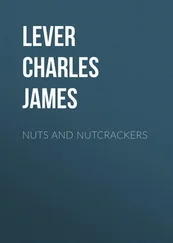Charles Lever - Diary And Notes Of Horace Templeton, Esq. Volume II
Здесь есть возможность читать онлайн «Charles Lever - Diary And Notes Of Horace Templeton, Esq. Volume II» — ознакомительный отрывок электронной книги совершенно бесплатно, а после прочтения отрывка купить полную версию. В некоторых случаях можно слушать аудио, скачать через торрент в формате fb2 и присутствует краткое содержание. Жанр: literature_19, foreign_antique, foreign_prose, на английском языке. Описание произведения, (предисловие) а так же отзывы посетителей доступны на портале библиотеки ЛибКат.
- Название:Diary And Notes Of Horace Templeton, Esq. Volume II
- Автор:
- Жанр:
- Год:неизвестен
- ISBN:нет данных
- Рейтинг книги:5 / 5. Голосов: 1
-
Избранное:Добавить в избранное
- Отзывы:
-
Ваша оценка:
- 100
- 1
- 2
- 3
- 4
- 5
Diary And Notes Of Horace Templeton, Esq. Volume II: краткое содержание, описание и аннотация
Предлагаем к чтению аннотацию, описание, краткое содержание или предисловие (зависит от того, что написал сам автор книги «Diary And Notes Of Horace Templeton, Esq. Volume II»). Если вы не нашли необходимую информацию о книге — напишите в комментариях, мы постараемся отыскать её.
Diary And Notes Of Horace Templeton, Esq. Volume II — читать онлайн ознакомительный отрывок
Ниже представлен текст книги, разбитый по страницам. Система сохранения места последней прочитанной страницы, позволяет с удобством читать онлайн бесплатно книгу «Diary And Notes Of Horace Templeton, Esq. Volume II», без необходимости каждый раз заново искать на чём Вы остановились. Поставьте закладку, и сможете в любой момент перейти на страницу, на которой закончили чтение.
Интервал:
Закладка:
In the Tyrol, however, such evidences of progress – as it is the fashion to call it – are rare. The peasantry seem content to live as their fathers have done, and truly he must be sanguine who could hope to better a condition, which, with so few prorations, comprises so many of life’s best and dearest blessings. If the mountain peaks be snow-clad, even in midsummer, the valleys (at least all in South Tyrol) are rich in vineyards and olive groves; and although wheat is seldom seen, the maize grows every where; the rivers swarm with trout; and he must be a poor marksman who cannot have venison for his dinner. The villages are large and well built; the great wooden houses, with their wide projecting roofs and endless galleries, are the very types of comfort. Vast piles of fire-wood, for winter use, large granaries of forage for the cattle – the cattle themselves with great silver bells hanging to their necks – all bespeak an ease, if not an actual affluence, among the peasantry. The Tyrolers are, in a word, all that poets and tourists say the Swiss are, and of which they are exactly the reverse.
It would be difficult to find two nations so precisely alike in all external circumstances, and so perfectly dissimilar in every feature of character. Even in their religious feelings, Romanism, generally so levelling, has not been able to make them of the same measure here. The Swiss Catholic – bigotted, overbearing, and plotting – has nothing in common with the simple-minded Tyroler, whose faith enters into all the little incidents of his daily life, cheering, exalting, and sustaining, but never suggesting a thought save of charity and good will to all.
That they have interwoven, so to say, their religious belief into all their little worldly concerns, if not making their faith the rule, at least establishing it as the companion of their conduct, is easily seen. You never overtake a group, returning from fair or market, that all are not engaged in prayer, repeating together some litany of the Church; and as each new arrival joins the party, his voice chimes in, and swells the solemn hum as naturally as if prearranged or practised.
If you pass a village, or a solitary farmhouse, at sunset, the same accents meet your ears, or else you hear them singing some hymn in concert. Few “Bauer” houses, of any pretension, are without the effigy of a patron saint above the door, and even the humblest will have a verse of a psalm, or a pious sentence, carved in the oaken beam. Their names are taken from the saintly calendar, and every thing, to the minutest particular, shews that their faith is an active working principle, fashioning all their actions, and mingling with all their thoughts. Their superstitions, like all simple-minded and secluded people’s, are many; their ignorance is not to be denied; mayhap the Church has fostered the one, and done little to enlighten the other: still, if Romanism had no heavier sin to account for, no darker score to clear up, than her dealings in these mountains, there would be much to forgive in a creed that has conferred so many good gifts, and sowed the seeds of so few bad ones.
These pious emblems find their way, too, into places where one would scarce look for them – over the doors of village inns, and as signs to little wine and beer-houses: and frequently the Holy personages are associated with secular usages, strangely at variance with the saintly character. Thus I have seen, in the village beside me, a venerable St. Martin engaged in the extraordinary operation of shoeing a horse; though what veterinary tastes the saint ever evinced, or why he is so represented, I can find no one to inform me. On the summit of steep passes, where it is usual, by a police regulation, to prescribe the use of a drag to all wheel carriages, the board which sets forth the direction is commonly ornamented by a St. Michael, very busily applying the drag to a heavy waggon, while the driver thereof is on his knees hard by, worshipping the saint, in evident delight at his dexterity. In the same way many venerable and holy men are to be seen presiding over savoury hams and goblets of foaming beer, and beaming with angelic beatitude at a party of hard-drinking villagers in the distance. Our present business is, however, less with the practice in general, than a particular instance, which is to be met with in the Bavarian Tyrol, mid-way between the villages of Murnou and Steingaden, where over the door of a solitary little way-side inn hangs a representation of the Virgin, with a starling perched upon her wrist. One has only to remark the expression of unnatural intelligence in the bird’s look, to be certain that it was not a mere fancy of the artist to have placed her thus, but that some event of village tradition, or history, is interwoven with her presence.
The motto contributes nothing to the explanation. It is merely a line from the Church Litany, “Maria, Mutter Grottes, hülf uns, – Mary, Mother of God, help us!”
There is then a story connected with the painting, and we shall, with your leave, tell it; calling our tale by the name of the little inn,
“MARIA HULF!”
Has our reader ever heard, or read, of those strange gatherings, which take place at the early spring in the greater number of southern German cities and are called, “Year Markets?” The object is simply to assemble the youth of the mountain districts in Tyrol and Vorarlbreg, that they may be hired, by the farmers of the rich pasture countries, as herds. Thither they go – many a mile – some children of ten or eleven years old, and seeming even still younger, away from home and friends, little adventurers on the bleak wide ocean of life, to sojourn among strangers in far-off lands; to pass days long in lonely valleys or deep glens, without a sight or sound of human life around them; watching the bright sun and counting the weary minutes over, that night and rest may come, per* chance with dreams of that far-off home, which, in all its poverty, is still cheered by the fond familiar faces! Some, ruddy and stout-looking, seem to relish the enterprise, and actually enjoy the career so promising in its vicissitudes; others, sad and care-worn, bear with them the sorrows of their last leave-taking, and are only comforted by the thought that autumn will come at last, and then the cattle must be housed for the winter: and then they shall be free to wend their way over mountain and plain, far, far away beyond Maltz – high in the wild peaks of the Stelvio, or deep in the lovely glens below Meran.
It was in one of these “Markets” at Inspruck that a little boy was seen, not standing with the groups which usually gather together under a single leader, but alone and apart, seemingly without one that knew him. His appearance bespoke great poverty; his clothes, originally poor, were now in rags; his little cap, of squirrel skin, hung in fragments on either side of his pallid cheeks; his feet – a rare circumstance – were bare, and bloodstained from travel; want and privation were stamped in every feature: and his eyes, which at that moment were raised with eager anxiety as some Bauer drew nigh, grew wan, and filling at each new disappointment to his hopes, for this was his third day to stand in the market, and not one had even asked his name. And yet he heard that name; ever and anon it met his ears in sounds which stirred his feeble heart, and made it throb faster. “Fritzerl! ah, Fritzerl, good fellow!” were the words; and poor Fritzerl would stoop down when he heard them and peep into a little cage where a Starling was perched – a poor, emaciated little thing it was, as way-worn and poverty struck, to all seeming, as himself: but he did not think so: he deemed it the very paragon of the feathered tribe, for it had a little toppin of brown feathers on its head, and a little ring of white around its neck, and would come when he called it; and, better than all, could sing, “Good Fritzerl – nice Fritzerl!” when it was pleased, and “Potztausend!” when angry. This was all its education; his master, poor little fellow, had not much more. How could he? Fritzerl’s mother died when he was a baby; his father was killed by a fall from a cliff in the Tyrol Alps, for he was by trade a bird-catcher, and came from the Engadine, where every one loves birds, and in the pursuit of this passion met his fate.
Читать дальшеИнтервал:
Закладка:
Похожие книги на «Diary And Notes Of Horace Templeton, Esq. Volume II»
Представляем Вашему вниманию похожие книги на «Diary And Notes Of Horace Templeton, Esq. Volume II» списком для выбора. Мы отобрали схожую по названию и смыслу литературу в надежде предоставить читателям больше вариантов отыскать новые, интересные, ещё непрочитанные произведения.
Обсуждение, отзывы о книге «Diary And Notes Of Horace Templeton, Esq. Volume II» и просто собственные мнения читателей. Оставьте ваши комментарии, напишите, что Вы думаете о произведении, его смысле или главных героях. Укажите что конкретно понравилось, а что нет, и почему Вы так считаете.












